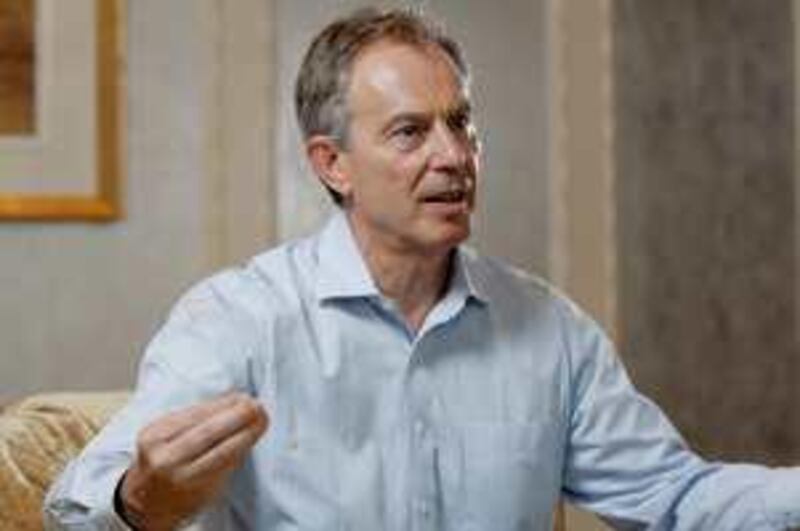LONDON // Tony Blair will make the startling claim today that he would have sanctioned the invasion of Iraq even if he had known beforehand that Saddam Hussein did not possess weapons of mass destruction (WMD). Both the former prime minister and George W Bush, who was US president at the time, have consistently justified the 2003 war on the basis of the threat to the region posed by the biological and chemical weapons that they believed Iraq to possess.
The assumption has always been that, had Iraq complied with UN weapons inspectors in 2002, the case for military intervention would have fallen by the wayside. But in a pre-recorded interview to be broadcast on BBC television today, the presenter Fern Britton asks Mr Blair if he would still have gone along with the US-led invasion if he had known at the time that there were no WMDs. "I would still have thought it right to remove him," Mr Blair replies. "I mean, obviously, you would have had to use and deploy different arguments about the nature of the threat.
"I can't really think we'd be better with him and his two sons still in charge." The remarks have produced a mixture of incredulity and anger among anti-war groups and politicians. Sir Menzies Campbell, who at the time was foreign affairs spokesman for the Liberal Democrats, the only major UK party to oppose the war, said Mr Blair's comments undermined the whole rationale given for the invasion. "I have no doubt whatsoever that if Mr Blair had told his cabinet what he is now saying, he'd have found it very difficult to keep all of them [from resigning].
"He did, of course, lose Robin Cook and, eventually, Clare Short," Mr Campbell said. "But the one place he would have undoubtedly failed would have been in the House of Commons. He would not have obtained the endorsement of the House of Commons on March 18, 2003, if he had been as frank with the House of Commons then as he appears to be willing to be frank with the BBC now." Mr Campbell said he was not surprised by Mr Blair's disclosure because of the "moral certainty" that the former prime minister had always displayed in reaching decisions.
"What does surprise me very much is that, despite what's gone on in Iraq and the benefits of hindsight, Mr Blair still does not realise what a foreign policy disaster Britain's involvement turned out to be," he added. Mr Campbell also said that the disclosure raised important questions about the legality of the invasion - questions that Mr Blair should be forced to answer when he appears before the Chilcot Inquiry into the Iraq war early in the New Year.
There have already been claims at the inquiry that, shortly before the invasion, Lord Peter Goldsmith, the then attorney general, had sent a handwritten note to Mr Blair advising him that the war could not be sanctioned under international law. The contents of the note were not passed on to Mr Blair's cabinet colleagues, it has been claimed, and they never made their way into the official records of the deliberations.
Within 10 days, Lord Goldsmith appears to have changed his mind and gone from having grave reservations to a position where he effectively endorsed the March 2003 invasion. Carol Turner, of the Stop the War Coalition, describes Mr Blair's admission today as "extraordinary" and shows that he was prepared to tailor his arguments to fit the circumstances. "It's not a matter of applauding his honesty now; it's a matter of attacking his lack of honesty and integrity in the circumstances," she said yesterday.
"It's such arrogance, isn't it? To assume that the public, which was so overwhelmingly opposed to the war at the time, will somehow accept that, oh, it's fine - he tailored his arguments to the circumstance." In the interview, Mr Blair describes the decision on military action as "incredibly difficult", adding: "That's why I sympathise with the people who were against [the war] for perfectly good reasons and are against it now, but for me, you know, in the end I had to take the decision."
He said his prime motivation for joining the invasion was the "notion of [Saddam] as a threat to the region, of which the development of WMDs was obviously one aspect". Mr Blair said that since the operation to remove Iraq from Kuwait, there had been 12 years of ineffectual activity by the United Nations during which time Saddam had used chemical weapons on his own people. "So this was obviously the thing that was uppermost in my mind - the threat to the region," he says.
Support for Mr Blair's position was offered by Hoshyar Zebari, Iraq's foreign minister and a Kurdish leader during Saddam's reign. "As Iraqis who have gone through the suffering and the agony of Saddam Hussein's regime, we support Tony Blair's statement," he said. "I believe it was worth it. "I believe Saddam Hussein's regime was an affront to the international community, to the international consciousness because of the atrocities, the crimes, he has committed."
@Email:dsapsted@thenational.ae





